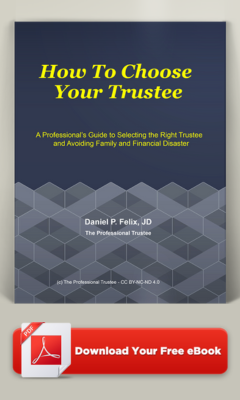Consider the textbook case of administering a trust for a beneficiary who is challenged by sticking to a budget. A trustee’s escalating instructions and imposing consequences at best treat a symptom, and at worst are destructive both to the beneficiary and to a positive collaborative relationship.
A successful approach may start with recognition of some of the inescapable forces at work with a heaping portion of compassion and patience.
The trustee may be matched with a beneficiary whose past is marked by some type of financial breakdown or challenge— or even incompetence.
This beneficiary may have disconnected to financial realities because of personality, temperament or habit, sometimes from an addiction. In this last category, over-spending is recognized along with substance abuse.
The beneficiary’s financial incompetence is highlighted by the stellar money savvy of the grantor, who amassed the fortune of whatever size which funds the trust. Everyone, including the beneficiary, may be painfully aware of the financial aptitude skipping over this direct descendent.
This financial incompetency is a known phenomenon with its own stereotypical negative archetypes of “trust baby” and “spendthrift” among other pejoratives.
Knowing the path to wholesome money stewardship is obstructed by this incompetence, the trustee too often squares off in a hostile tango— hiding behind strictures of trust language and scoring points for denying distribution requests.
Some well-intentioned trustees fall into the trap of trying to return to the path by merely intellectual means: issuing directions and instructions on how the beneficiary should do things differently. Like the infamous ugly American tourist, they think that simply speaking louder will result in both understanding and compliance.
In these scenarios, trust assets, a flourishing beneficiary and trustee equanimity may all end up as casualties.
It doesn’t have to be this way.
In fact, some of those financially challenged beneficiaries can win success— a success as measured by both the beneficiary himself as well as objective financial stewardship. I’ve been lucky to have administered on behalf of a few of those myself.
The path to guiding such beneficiaries starts with the embrace of certain realities.
We should expect the pendulum swinging away from the grantor’s gifts. We’ve noticed the intergenerational oscillation of business savvy among other attributes. We know that sometimes parents produce opposites.
For another matter, it may be that most all of us fall somewhere on the spectrum of financial competence: from those who have everything done perfectly (which perfection doesn’t exist any more in this realm than it does in any other) to those who seem to be whirling downward at a frightening acceleration.
And the trustee himself is on that spectrum, too. His journey is accentuated by his work with others: the level of compassion and patience— or lack of it— that he shows such beneficiaries may well reflect some part of his feelings for himself and his own situation.
For me, my long list of financial descansos start from a grandfather who committed suicide; a once prominent NYC lawyer from a financially successful family, who separated from this world and his young family undoubtedly over how he handled money. Those who have studied and cared for family dynamics of suicide have seen the intergenerational impact, which echoes fall out extending into the biblically described succeeding generations.
All of which suggests why an exclusively intellectual approach is typically inadequate. Such an approach ignores the often deep psycho, spiritual, emotional, if not also karmic and otherwise energetic components of the situation. Ignoring these other components can be counter-productive. Especially so, punishing and shaming the beneficiary for what he often already feels poorly about usually doesn’t help, even if the ends could justify the means.
Given the importance of compassion and patience for success, it’s understandable that key resources in moving through this challenge are female— often directing their healing message to other women. These include Bari Tessler and Barbara Stanny, among others— whom I’ve found helpful personally as well as professionally.
Of course, the trustee’s approach and ultimate success is also dictated by how open the beneficiary is to honestly dealing with the situation and his commitment to moving forward. The trustee cannot do this himself; however, he often has more power to create the right environment and relationship than is assumed.
In my experience, helpful stimulation can include an exciting future vision combined with a commitment to do the work to get there grounded in a relationship of trust and mutual respect.
As with so much else in successful administration, how the trustees do it— as well as what they do— can make all the difference.
© 2016 – 2023 Daniel P. Felix, all rights reserved.


